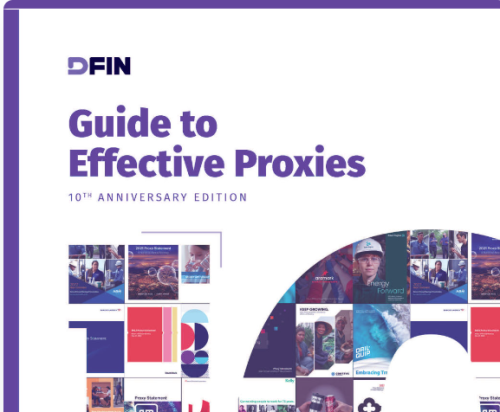If certain ESG metrics have a material impact on a business’ performance – which is widely accepted – then it follows that investors, regulators and proxy advisers will likely seek assurances that executives are incentivized to meet expectations.
In this feature for the Spring issue of IR Magazine, we look at the efforts being made around the world to tie ESG metrics to executive compensation. Due to the difference between pay packages in different parts of the world, we have focused our reporting on three key regions: North America, Europe and Asia. Today, we publish an extract of the North America focus, to be followed by the Europe and Asia focuses.
While the ESG data ecosystem can make one’s head spin, it’s also true that there is more consensus between issuers and investors on ESG materiality now than there has ever been. Each year brings more inaugural sustainability reports across North America and greater discussion of ESG during routine investor meetings, earnings calls and annual meetings.
This shared definition of a company’s material ESG risks and opportunities is leading to greater investor expectation that managers will be compensated – at least in part – based on their company’s performance relative to those risks and opportunities. As the Covid-19 pandemic forced employee safety, security and productivity to the foreground of investor conversations, it will likely also prompt greater scrutiny of executive compensation packages.
Similarly, the conversations we are having across society about racial equality, justice and equity will likely become a more prominent governance issue, akin to the established dialogue about gender diversity.
The last 12 months have raised a number of pressing issues that could shape future discussion of executive compensation packages, coupled with the existential threat of climate change and the financial risk associated with global temperature increases.
Will investors look unfavorably on CEOs who maintain their pre-Covid-19 compensation packages, having furloughed or laid off staff? Will large bonuses be paid to executives at companies that experienced significant Covid-19 outbreaks? And what expectations do investors have of companies to link ESG to executive compensation metrics?
‘Investors are going to start asking more often for progress on ESG,’ says Robin Ferracone, founder and CEO of Farient Advisors. ‘Combine that interest with the effects of Covid-19 and the SEC asking companies to enhance their human capital management disclosures and companies will need to tell more of a story about how they’re thinking regarding ESG integration.’
How many companies currently link ESG to executive compensation?
Linking ESG to executive compensation is still in its infancy in North America – excluding sectors like energy and utilities, where environmental metrics are inherent in the company’s business model – and there are differing accounts of how common it is. Separate studies from ISS Corporate Solutions and Pearl Meyer suggest that between 15 percent and 20 percent of companies in the S&P 500 tie ESG to executive compensation, but other surveys put that number much higher.
‘Incorporating ESG metrics into pay makes sense at a high level,’ says Jun Frank, executive director at ISS Corporate Solutions. ‘How to design it and how to set the targets is more difficult, however. I believe most companies in most industries are now in an exploration phase. To the extent that you’re talking to investors and soliciting their feedback on what they expect from you, that seems like an appropriate step to take.’
When it comes to the design of the compensation plan itself, the companies that do link ESG to a component of executive compensation tend to favor baking it into short-term incentive plans (Stips), rather than long-term incentive plans (LTIPs). Analysis by ISS Corporate Solutions shows that in the S&P 500, 14.6 percent of companies link ESG to Stips, while only 1 percent link to LTIPs.
One of the challenges of linking ESG to executive compensation currently is that it requires a clear articulation of material ESG issues that is understood at the board level. Without that, ESG ties to compensation could ring hollow, says Courteney Keatinge, senior director of ESG research at Glass Lewis.
‘What concerns me is when I don’t think there has been sufficient conversation about why companies chose the metrics they did and what thought went into that,' she explains. 'I have a lot of conversations with companies about inclusion in the Dow Jones Sustainability Index, for example, and linking that to executive compensation metrics. But does that really help shareholders and the company in the long term, or do they just want to check a box and have investors give them a gold star?’
The vast majority of board directors in North America spent their careers in executive roles at public firms at a time when ESG wasn’t a prominent issue. While boards and compensation committees are rapidly becoming more proficient with ESG materiality – often aided by teach-ins and off-season shareholder engagement – Ferracone says it’s more important for boards to take their time on linking ESG to executive compensation than to rush it and produce links that seem inauthentic.
‘I recommend that companies pilot a measure for a year because they won’t have any experience of creating a baseline of performance,’ Ferracone says. ‘What should our diversity metrics look like? Should we include ethnic and gender diversity? How do we measure that in different parts of the world? How do we measure employee safety? It can be complex and companies should go through a year of piloting it first.’
Keatinge agrees. She says she has seen situations where companies have linked executive compensation to employee safety in the past and it has created a culture where workplace accidents are then under-reported. Rushing into these complicated issues can have an adverse effect, she warns.
This is an extract of an article from the Spring 2021 issue of IR Magazine.










